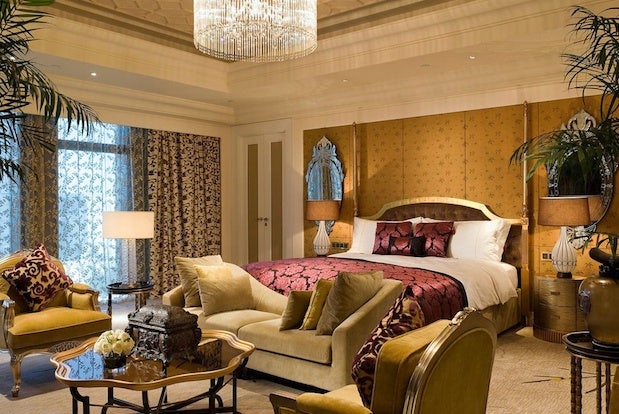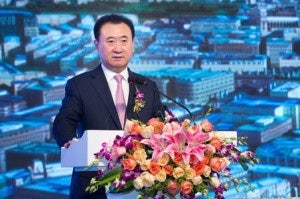Dalian Wanda Squares Off Against Fierce Competition#

A room in the Sofitel Wanda Beijing Hotel. In China, Dalian Wanda has relied heavily on partnerships with foreign hotel brands, but will be striking out on its own with this new acquisition. (Sofitel Wanda Beijing Hotel)
As Chinese real estate conglomerate Dalian Wanda confirmed its acquisition of Sunseeker Yachts yesterday, it also provided more details about its soon-to-be constructed luxury hotel in London, as well as its plans to construct a global chain of five-star lodging locations aimed at both Chinese and other international travelers. The question now is: once Wanda builds it, will they come?
“Through the international development of Wanda hotels, we are confident that we will be the leader in bringing branded Chinese luxury hotels to the global market, where they have long been absent," said Dalian Wanda Chariman Wang Jianlin at the press conference extravaganza announcing the deal.
For the first luxury hotel of its kind operated by a Chinese firm overseas, Wanda plans to invest £700 million ($1.09 billion) in a self-branded location that will be built in London's Nine Elms regeneration site on the city's South Bank. The art deco-style hotel will have 160 rooms, 63,000 square meters of luxury apartments, and a rooftop swimming pool. In addition to the London deal, Wang also revealed his wide-ranging ambitions to have hotels in eight to 10 cities across the world within the next decade, and confirmed a luxury hotel project in New York that is currently in the works.

Dalian Wanda Chairman Wang Jianlin at the company's press conference announcing the acquisition of yachtmaker Sunseeker and the construction of a new luxury hotel in London. (Dalian Wanda)
This new development is significant for several reasons. In addition to serving as a marker of Chinese companies moving up the value chain as they make an increasing number of foreign acquisitions, it also demonstrates an inclination to eschew its reliance on foreign brand names that have been so important to past acquisitions and partnerships. Wang told The Wall Street Journal that the hotels would be aimed at customers from all countries rather than just those coming from China. It remains to be seen whether or not his hotels will stack up against fierce foreign competition in being able to woo both Chinese and other international travelers.
Chinese acquisitions of foreign luxury, leisure, and entertainment brands are no longer a novelty, but companies to date have sought out established European, British, and U.S. brands with well-known heritage. Dalian Wanda was likely aware of this approach when it purchased both British yachtmaker Sunseeker and American theater chain AMC. In addition, its 38 five-star hotels in China have also banked on foreign partnerships with household names such as Sofitel, Westin, Doubletree, Hilton, Sheraton, and more.
The choice to build a Chinese branded luxury hotel is already a bold move on the mainland, where international brands reign, but for Wanda to build one abroad is a journey into uncharted territory. In a hospitality industry with so many international heavyweights vying for the attention of the world's jet-setters, Wanda certainly has its work cut out for it. In the words of The Wall Street Journal,
…the hotel industry, in which Wanda will be the first Chinese company to step into the luxury segment, is fierce and full of well-established rivals that have cornered the luxury-hospitality market and have long navigated the high expenses involved with serving luxury consumers globally.
The brand also has some key advantages in courting Chinese travelers. With the ranks of Chinese tourists rising rapidly, both domestic and international hotels have been increasingly gearing their accommodations toward them, and a Chinese hotel certainly has the edge to take advantage of this fact. In addition, the decision to include luxury apartments is likely aimed at Chinese investors who are increasingly looking to luxury real estate abroad, as luxury housing is being snapped up on the mainland faster than people's incomes can rise high enough to move into it. However, Chinese luxury clients still often lean toward foreign brands, so it will be up to Wanda to convince them that a homespun hotel is a better choice when traveling abroad.
Wang is aware of the challenges facing him, but remains unwavering in his plan for a future Chinese hospitality empire. "Half of international acquisitions are going to fail, especially for China, which is just going international," he told The Wall Street Journal. "But Chinese companies will become international companies sooner or later, so we have to take this step. Failures are our tuition."